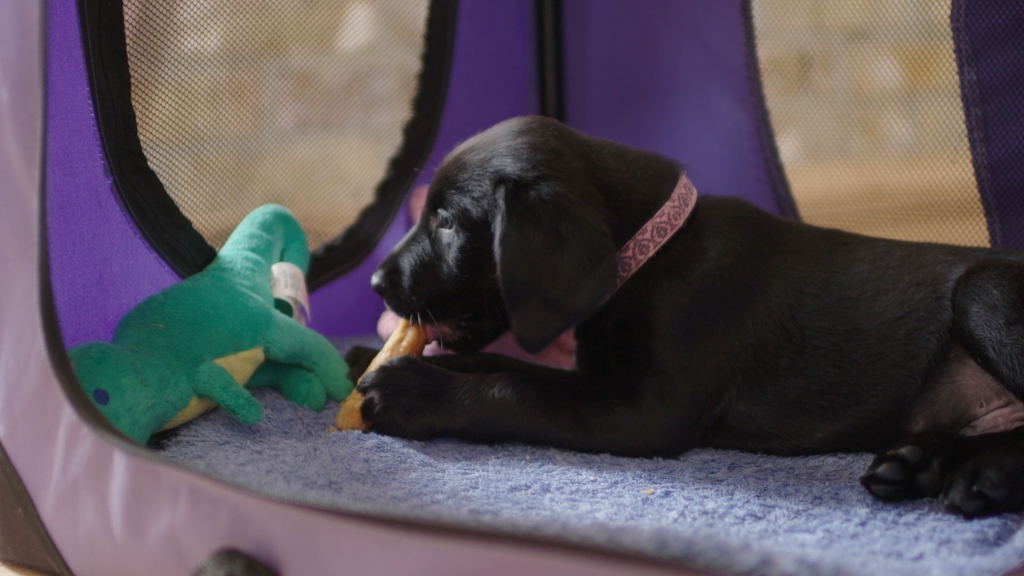
Dog occupied with a long lasting chew
Dogs Owners Are Urged To Prepare Their Pet For Being Left Alone As Life Opens Up Following Pandemic
New research from Dogs Trust shows that one in ten pet dogs developed separation-related behaviours during the pandemic that they didn’t have before.
Many dog owners have been able to spend more time at home with their pets since the first lockdown in March 2020. Increased time together and companionship offered by our dogs has boosted the nations morale and helped us cope throughout this period, however, there have been concerns that some dogs might find it harder to cope when they are left alone again for longer periods of time.
Researchers at Dogs Trust followed a group of almost two thousand dog owners during 2020 to track the impact the pandemic has had on them and their four-legged friends. Surveyed in May and October of 2020, the results show that 10% of dogs who had previously been ok when left alone, developed signs of separation-related behaviours when left alone as restrictions eased.
Separation-related behaviours (SRBs), such as barking/howling, pacing, toileting or destroying household items, were some of the new behaviours that appeared when dogs were left without human company, and could even occur in the company of a canine companion. These behaviours can be problematic for dog owners but may also be a welfare concern for the dogs because they might indicate that the dog is in a negative emotional state.
The data shows that between 17% and 22% of pet dogs experience SRBs, although without using remote recording equipment, it can be hard to know what our dogs are really getting up to when they’re alone, and thiscould be an underestimate of the true figures.
On a more positive note, the survey found that people generally weren’t leaving their dogs alone for as long as they were before the pandemic, and one in two dogs who had separation-related behaviour before the pandemic, were reported to show no signs of SRB eight months later.
Jenna Kiddie, Head of Canine Behaviour said: “During the pandemic, many owners have been able to spend more time with their dogs. This change of routine means some dogs being left on their own for much shorter periods than they were before.
“Over the months of our study, it was reported that one in 10 dogs had developed new separation related behaviours. The dogs most at risk of developing these new behaviours were those whose time left alone was reduced most during lockdown.
“This highlights the importance of preparing your dog to be left alone for longer periods again, by gradually building up time spent apart and incorporating this into your daily routine.
“With working from home guidance easing throughout the country, it’s likely that more dogs will have less company at home again, meaning more time alone. It’s important that we prepare our dogs for this change to prevent separation related behaviour problems from developing.
“One of the most common reasons dogs are handed into Dogs Trust is behaviour-related issues that could have been prevented early on. A rise in problematic behaviours due to lockdown measures, such as separation anxiety, could mean families feel they have no other option but to give up their dog. We run Dog School training classes and have lots of online training resources for dog owners who need help and support with their dog’s behaviour.”
More information and tips about helping your dog cope with being left alone can be found on our website: https://www.dogstrust.org.uk/help-advice/training/help-your-dog-enjoy-time-alone and information about Dog School can be found here: https://www.dogstrust.org.uk/help-advice/dog-school/
More from Dogs Trust
- New Animal Welfare Strategy positive step forward, but still more to do, says Dogs Trust
- Beware of the red flags – WARNING for anyone looking to buy a pet online this Christmas
- "A victory for compassion”: Puppy Smuggling Bill to become law
- As freezing weather hits the UK, Dogs Trust warns owners to wipe pooches’ paws after walks to avoid illness
- Majority of Brits say ‘Enough’ to Firework Fright – Dogs Trust research shows two-thirds of Brits want tighter controls on fireworks

 4 years ago
4 years ago  1368 views
1368 views

 1 day ago
1 day ago